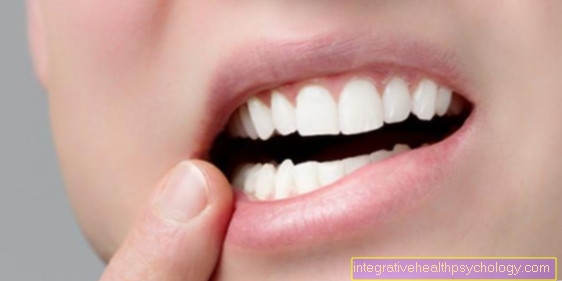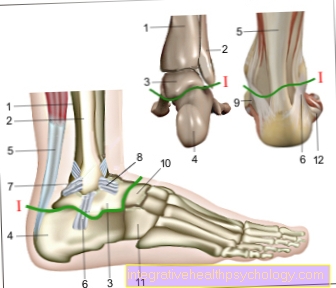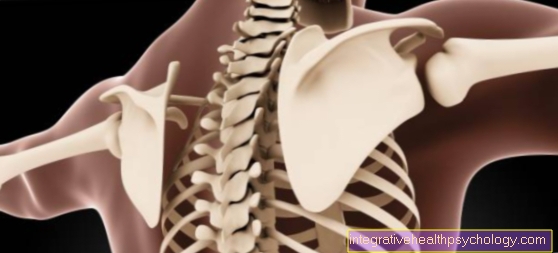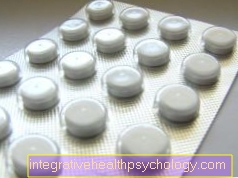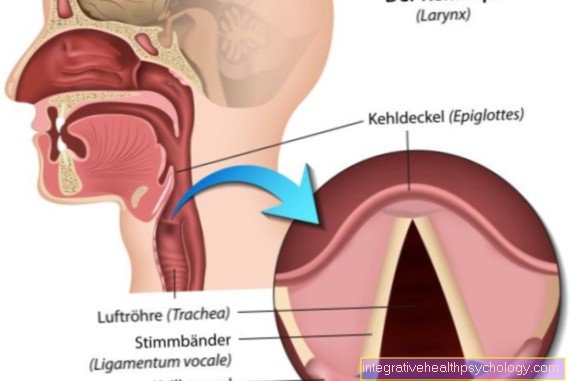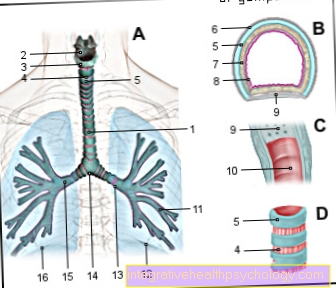How can I strengthen the immune system in my child?
introduction
The human immune system is subject to a life-long learning process and is therefore constantly changing. It is therefore only logical that children, and especially babies, usually do not yet have particularly strong protection from their immune system. This only develops over time and is trained by all sorts of different environmental influences. Although getting older is the best training for the immune system, there are some other ways to strengthen and train it from an early age.

How does the immune system in children differ from adults?
As already mentioned, the immune system is subject to a constant learning process. So that the baby is not born completely unprotected, the infant receives so-called "nest protection" from the mother in the last months of pregnancy. This is a certain type of antibody (IgG) that is small enough to get into the fetus from the mother's blood in the placenta.
Antibodies are formed by the human immune system as part of a reaction to foreign bodies (antigens). They bind these foreign bodies, such as bacteria or viruses, making them easier to attack and kill. In this way, the baby receives all the antibodies from the mother, which she has formed in the course of her life. This protects the baby against a large part of the potential infections for the first few months after birth.
Another protection is passed on from mother to child through breastfeeding. However, this is a different type of antibody (IgA), which is particularly active in the human mucous membrane. While the nest protection and the protection of breastfeeding continue, the baby is already starting to build its own immune system. As soon as the mother's protection disappears, the baby is completely on her own. As a result, toddlers and children alike have an incomplete immune system and are therefore significantly more susceptible to infections and diseases than adults.
Which home remedies help?
To strengthen the immune system and prevent diseases, certain behavior in everyday life and some home remedies are very suitable. Diet is an important part of a healthy body. With regard to the immune system, a diet rich in vitamins (especially fruit and vegetables) and low in sugar is particularly helpful. Vitamin C in particular plays a crucial role in this. Vitamin C-rich foods are for example lemon, paprika or orange.
A sufficient intake of trace elements such as zinc, iron, calcium and magnesium can also strengthen the immune system. Studies have shown that exercise, especially endurance sports, has a positive effect on the functioning of the immune system. They were able to show that physically active people fall ill less often and for a shorter period of time. Another very important aspect, which plays a role especially in everyday life, is the reduction of stress. This lowers the cortisone level in the blood and the immune system becomes more active.
Read more on this topic at: Which home remedies strengthen the immune system?
Homeopathy / globules
There are some herbal ingredients that can strengthen the immune system. These can be used either regularly or when needed through teas, baths or inhalation. Ginger, eucalyptus, echinacea, elderberry, taiga root, sea pebbles, tea tree oil, lemon verbena, chamomile or ivy are used particularly frequently.
The treatment with globules is very extensive and can vary greatly depending on the symptoms and the person. It is therefore advisable to discuss an appropriate therapy with a homeopath. This will also determine the correct potency and dosage. It is important whether it is just a general strengthening of the immune system or whether symptoms have already arisen and these should be alleviated. The following homeopathic remedies are often used to strengthen the immune system: Echinacea, Calendula, Arnica, Kalium phosphoricum and Kalium sulfuricum.
Which Schüssler salts can help?
The idea behind a treatment with Schüssler salts is that the respective disease is caused by an imbalance of minerals in the cells. Schüssler salts contain certain minerals in very low potency. In the case of an acute illness (e.g. cold or an incipient inflammation), it is assumed that there is a lack of iron. Therefore, the Schüssler salt number 3: Ferrum phosphoricum in the potency D12 is recommended. This is supposed to supplement the lack of iron so that the immune system can work optimally. Usually the administration of potassium sulfuricum (D6) and magnesium phosphoricum (D6) is recommended as concomitant medication. These can increase the effectiveness of the Ferrum phosphoricum and thus contribute to recovery. Since the administration of Schüssler salts can vary greatly depending on the specific clinical picture, it should first be clarified and adjusted by a medical doctor. Mostly Schüssler salts are given over a longer period of time. However, an effect of Schüssler salts has never been proven.
Read more on this topic at: Schüssler salts
Which drugs from the pharmacy can help?
Most drugs that strengthen the immune system and are available in pharmacies use the effects of individual or combined active ingredients. These are usually vitamins, trace elements or herbal ingredients. These are often offered in a combination as juice, effervescent tablet or tablet. It should be noted, however, that most of these products could not be proven to be effective. A possible overdose of individual substances is also a hazard. In addition to the ingredients mentioned above, there are also products that contain bacteria, so that you can maintain your natural bacterial flora and thus get sick less often. However, this must also be viewed critically, as these can only protect against bacterial infections.
Read more on the topic: Which drugs strengthen the immune system?
Sanostol®
Sanostol® is a multivitamin mixture developed for children, which is available both as a juice and as an effervescent tablet. It contains vitamins A, C, D3, E, B1, B2, B3, B6 and provitamin B5. According to the manufacturer, it is suitable for strengthening the immune system, for preventing infections and for taking in case of malnutrition. The specified ingredients are in fact immune-strengthening vitamins, which should be adequately absorbed through food. According to Stiftung Warentest, however, Sanostol contains too high an amount of vitamin A, which can be harmful under certain circumstances. The agent should not be able to keep the promised effect either.
zinc
Zinc is built into numerous enzymes as a structural element and is therefore involved in many metabolic pathways in the body. Studies have shown that zinc suppresses the non-specific immune system and promotes the specific system. The unspecific, early immune system is responsible for the disturbing symptoms. With a cold, for example, this would cause a runny nose and cough. The specific, late system, which usually only becomes active after a few days, is much more effective and can usually fight the disease well. Zinc is found in numerous foods, and it is particularly abundant in oysters, beef and legumes.
Which vitamins can help?
In principle, all vitamins are important to achieve optimal physical function. But a few are particularly necessary for the immune system. These are mainly vitamins C, A, D and E. Vitamins C and E can eliminate so-called radicals and render them harmless, thereby supporting the immune system. Vitamin C is also responsible for the formation of immune cells (white blood cells). Vitamins A and D can functionally support the immune system. There are studies that show that vitamin C partially suppresses the immune system, which weakens it, but alleviates the symptoms (e.g. cold symptoms). This can be very useful, especially in the first few days of a cold.
Read more on this topic at: Vitamin preparations
Can exercise help my child or does it make them sick more often?
Sport plays an important role in strengthening the immune system and overall health. Studies have shown that endurance sports such as jogging, swimming or cycling strengthen the immune system. How exactly this works has not yet been conclusively clarified. This probably leads to an increased activation of the immune system. Athletes are therefore less likely to get sick and, if they are sick, get better sooner.
Thus, sport can ensure that a child gets sick less often and strengthens their immune system. It is important, however, that this relates to exercise during a healthy state. If symptoms are already present or if an illness has only occurred very recently, exercise, and especially endurance sports, is strongly advised against. The reason is the risk of the pathogens being spread into the heart due to the increased blood flow. In addition, the body is heavily stressed, which can worsen the state of health or prolong recovery.
How can I strengthen the immune system after my child has taken an antibiotic?
According to the latest results from investigations and studies, the microbiome (the entirety of all bacteria colonizing humans) plays an extremely important role in the defense function and for the immune system of humans. Several billion bacteria have created a living space within the human colon (intestinal flora) and make a significant contribution to digestion. Most of these bacteria are killed off during antibiotic therapy. This reduces the competition of bacteria within the intestine, which in turn gives new bacteria the opportunity to colonize.
Therefore, the most common side effect of antibiotics is diarrhea. The numerous kills of the microbiome also weaken the body's immune system. This is usually not noticed during therapy, as the antibiotic also kills harmful bacteria. However, after such medication administration, there is often an increased susceptibility to infections and a prolonged duration of illness. The best way to rebuild your intestinal flora and thus the immune system as quickly as possible is an appropriately adapted diet. Dairy products or certain nutritional supplements are best suited as these have a positive effect on the growth of bacteria in the intestine. In addition, the diet should be as diverse as possible in order to enable a large variety of bacteria.
How can I strengthen the immune system after a vaccination?
After a vaccination, the immune system is stressed because it should produce antibodies against this particular disease. It is therefore important to take care of your body in the first few days after the vaccination and not to strain it any further. This means initially not to carry out any demanding sporting activity or other stressful actions. In addition, the body should be kept warm, as the immune system can work optimally at higher body temperatures. The above-mentioned home remedies that strengthen the body's defenses can also be used.
Read more on this topic at: Vaccinations in the baby
How can I improve my child's immune system after a cold?
After a cold, the immune system does not necessarily have to be strengthened. This has successfully fought bacteria in the mucous membrane in the last few days or weeks, otherwise the cold would not be gone. The immune system is therefore in a very active phase and another cold is unlikely. However, supportive measures (see home remedies, homeopathy, sport, ...) can be used to keep the immune system functioning properly and thus to stay healthy in the long term.

